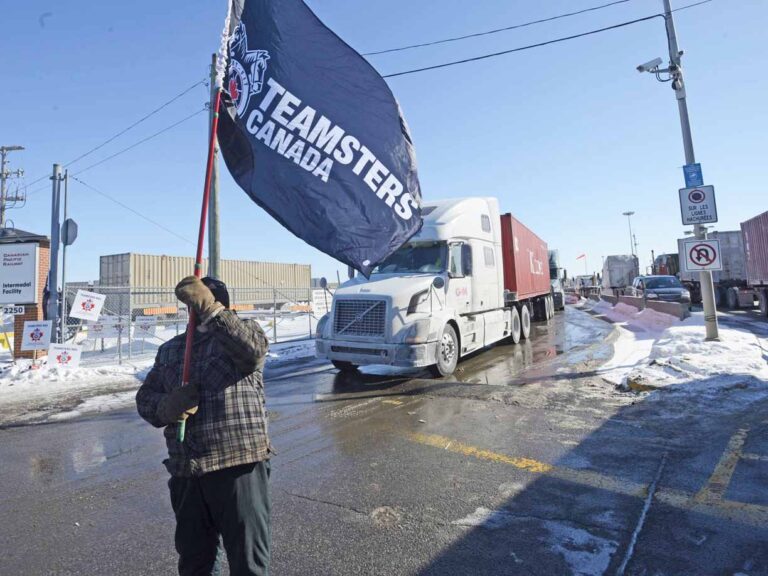|UPDATE|
DETROIT — Canadian Pacific Railway announced this morning that it had reached an agreement with the Teamsters Canada Rail Conference to work with an arbitrator on the unresolved components of the contract negotiations. As a result, the railroad is resuming normal operations today at 12 p.m. local time – ending the two-day shut down.
|PREVIOUS STORY|
DETROIT — Canadian Teamsters and CP Rail blamed each other for a work stoppage Sunday that brought trains to a halt across Canada and interrupted fertilizer and other shipments to and from the U.S.
More than 3,000 Canadian Pacific Rail conductors, engineers, train and yard workers represented by the Teamsters Canada Rail Conference are off the job after both sides couldn’t reach a deal by a midnight deadline.
Both sides say they are still talking with federal mediators.
National Grain and Feed Association (NGFA), The Fertilizer Institute (TFI) and 19 other members of the Agricultural Transportation Working Group in a letter to President Joe Biden requested his administration work with the Canadian government to rescind the cross-border COVID-19 vaccine mandate for workers moving essential commerce.
The letter urged the U.S. and Canadian governments to modify or rescind their mandates blocking unvaccinated foreign nationals, including truck drivers, from crossing the border. Canada’s vaccine mandate requires U.S. truckers to show proof of vaccination before entering the country, and the U.S. mandate requires foreign cross-border truckers to be vaccinated.
The U.S .Department of Homeland Security has said its border policy will remain in effect through April 21.
“The border policy has raised prices because it has constrained trucking capacity and made truck movements more expensive and less timely,” the letter stated.
More than 1 million short tons of fertilizer cross the US-Canada border by truck each year. March, April and May are peak months for fertilizer applications across the northern states.
Canadian Pacific covers much of the U.S. Midwest and is a large shipper of potash and fertilizer for agriculture. It also carries grain from the U.S. to its northern neighbor for domestic use and exports. The railroad serves the Dakotas, Minnesota, Iowa, Illinois, Wisconsin, Missouri and other states, according to a map on its investor website.
CP also operates in New England and upstate New York, spokesman Patrick Waldron said.
CP says it’s the leading carrier of potash, a plant nutrient used in the production of multiple crops. The company says in investor documents that it carries 70% of the potash produced in North America, all from mines in Saskatchewan.
The railroad says it also carries fertilizers, including phosphate, urea, ammonium sulfate, ammonium nitrate and anhydrous ammonia. About half its fertilizer shipments originate from processing plants in Alberta.
CP got 29% of its 2020 freight revenue from cross-border shipments between the U.S. and Canada, its investor website said.
A lengthy interruption of fertilizer shipments could hurt U.S. farmers, who are nearing the spring planting season. The work stoppage could also exacerbate existing supply chain bottlenecks in the U.S. and Canada that stem from the COVID-19 pandemic.
U.S. trains were not affected by the work stoppage, but the railroad cannot make shipments between the two nations, Waldron said.
On Saturday, the Teamsters said in a statement that the company had locked the workers out, but later issued another statement saying the workers were also on strike.
The original statement posted to the Teamsters Canada Rail Conference website late Saturday said the union wanted to continue bargaining but the company “chose to put the Canadian supply chain and tens of thousands of jobs at risk.”
“As Canadians grapple with a never-ending pandemic, exploding commodity prices and the war in Ukraine, the rail carrier is adding an unnecessary layer of insecurity, especially for those who depend on the rail network,” the statement said.
CP Rail, Canada’s second-largest railroad operator, said it was the company that wanted to keep talking, and the union that pulled its employees off the job.
CP President Keith Creel said in a news release the union “failed to respond” to a new offer presented by mediators before the midnight deadline.
“Instead, the TCRC opted to withdraw their services before the deadline for a strike or lockout could legally take place,” he said. “The TCRC is well aware of the damage this reckless action will cause to the Canadian supply chain.”
Labor Minister Seamus O’Regan urged the two sides to keep bargaining.
The Canadian and U.S. supply chains also were hit by trucker convoy protests blocking border crossings in February, and now are dealing with the effects, particularly on global fuel supplies, of the Russian invasion in Ukraine and sanctions imposed by the U.S. and its allies.
All the disruptions pushed inflation to its highest level since the early 1980s, with essentials such as food and fuel facing some of the sharpest price hikes.
CP and the union have been negotiating since September, with wages and pensions a sticking point. A clause on where employees take their federally mandated break periods is also an issue.
CP Rail says this is the fifth work stoppage since 1993.
The Trucker Staff contributed to this report.
The Associated Press is an independent global news organization dedicated to factual reporting. Founded in 1846, AP today remains the most trusted source of fast, accurate, unbiased news in all formats and the essential provider of the technology and services vital to the news business. The Trucker Media Group is subscriber of The Associated Press has been granted the license to use this content on TheTrucker.com and The Trucker newspaper in accordance with its Content License Agreement with The Associated Press.






